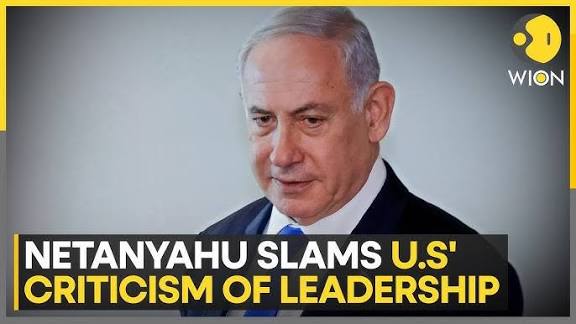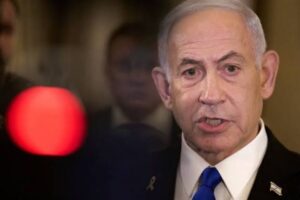Netanyahu Slams Allies: No Palestinian State It Will Not Happen After Recognitions

The recognition of a Palestinian state is definitely not registered among the people of Gaza until it is stopping. Today we will discuss about Netanyahu Slams Allies: No Palestinian State It Will Not Happen After Recognitions
Netanyahu Slams Allies: No Palestinian State It Will Not Happen After Recognitions
Israeli Prime Minister Benjamin Netanyahu has issued a stern warning to Western nations recognizing Palestinian statehood, declaring unequivocally that “it will not happen.” His remarks come in the wake of recent announcements by the United Kingdom, Canada, Australia, and Portugal, who have formally recognized Palestine as an independent and sovereign state. Netanyahu’s response underscores Israel’s firm stance against unilateral recognitions and highlights the deepening diplomatic rift between Israel and several of its traditional allies.
Netanyahu’s Strong Rejection

In a statement released on September 21, 2025, Netanyahu condemned the recognitions as an “absurd prize for terrorism,” accusing the foreign leaders of rewarding Hamas, the militant group responsible for the October 7, 2023, attacks that resulted in the deaths of approximately 1,200 Israelis. He emphasized that such actions undermine efforts to achieve peace and stability in the region. Netanyahu further asserted, “There will be no Palestinian state west of the Jordan River,” reaffirming Israel’s long-standing position on the matter.
The Israeli Prime Minister also announced plans to discuss Israel’s response to these recognitions during his upcoming visit to the United States, where he is scheduled to meet with former President Donald Trump. This meeting is expected to address the broader implications of the recognitions and formulate a coordinated response.
International Reactions
The formal recognitions by the UK, Canada, Australia, and Portugal have sparked a wave of reactions across the international community. These nations argue that recognizing Palestinian statehood is a necessary step towards achieving a two-state solution and ensuring a just and lasting peace between Israelis and Palestinians. They emphasize that such recognitions are not intended to reward terrorism but to support the aspirations of the Palestinian people for self-determination and statehood.
However, Israel and its allies, including the United States, have expressed strong opposition to these unilateral recognitions. They contend that such actions undermine the peace process and could embolden extremist elements within Palestinian society. The U.S. has warned that these recognitions could lead to punitive measures against the recognizing countries and have a detrimental effect on regional stability.
Domestic Implications in Israel
Within Israel, Netanyahu’s stance has garnered support from his right-wing coalition partners, who advocate for the annexation of the occupied West Bank and reject any form of Palestinian sovereignty. Ministers like Bezalel Smotrich and Itamar Ben-Gvir have been vocal in their opposition to the idea of a Palestinian state, viewing it as a threat to Israel’s security and identity.
However, Netanyahu’s position has also faced criticism from opposition figures and segments of the Israeli public. Critics argue that his hardline approach risks further isolating Israel diplomatically and could exacerbate tensions with both Western allies and Arab nations. There are growing calls within Israel for a negotiated resolution to the conflict that considers the legitimate aspirations of both Israelis and Palestinians.
Broader Geopolitical Context
The recent wave of recognitions of Palestinian statehood occurs against the backdrop of a prolonged and devastating conflict in Gaza, where over 65,000 Palestinians have been killed since the escalation of hostilities in October 2023. The international community has expressed deep concern over the humanitarian crisis and the lack of progress towards a peaceful resolution. The recognition of Palestine by several Western nations is seen as an attempt to reinvigorate the peace process and provide a counterbalance to the prevailing dynamics in the region.
However, Netanyahu’s rejection of these recognitions and his government’s policies, including the expansion of settlements in the West Bank and the proposed annexation of large parts of the territory, have raised alarms among European and Arab leaders. Countries like Saudi Arabia and the United Arab Emirates have cautioned Israel that such actions could jeopardize normalization agreements and further destabilize the region.
Looking Ahead
As Netanyahu prepares to meet with former President Trump and address the United Nations General Assembly, the international community watches closely to see how Israel will respond to the growing wave of recognitions of Palestinian statehood. The outcome of these diplomatic engagements could have significant implications for the future of the Israeli-Palestinian conflict and the broader Middle East peace process. The challenge remains to find a path that respects the rights and aspirations of both Israelis and Palestinians and leads to a just and lasting peace in the region.
How useful was this post?
Click on a star to rate it!
Average rating 0 / 5. Vote count: 0
No votes so far! Be the first to rate this post.
About the Author
usa5911.com
Administrator
Hi, I’m Gurdeep Singh, a professional content writer from India with over 3 years of experience in the field. I specialize in covering U.S. politics, delivering timely and engaging content tailored specifically for an American audience. Along with my dedicated team, we track and report on all the latest political trends, news, and in-depth analysis shaping the United States today. Our goal is to provide clear, factual, and compelling content that keeps readers informed and engaged with the ever-changing political landscape.




